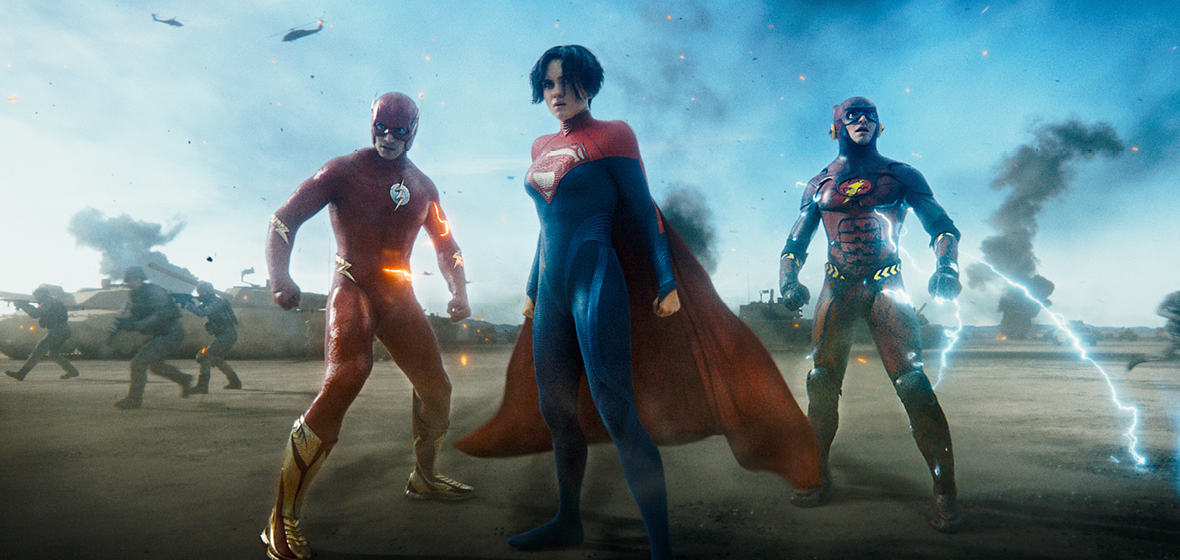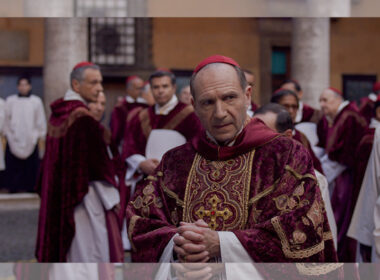Every good critic wants all films to be good. Our job is to contextualise a piece of work, apply the experience and understanding we have of it and reason why, in our opinion (of course), it is or is not worth your time. If I do my job correctly, my words, regardless of the rating I give the film, will either spur your curiosity or extend your apathy.
The Flash is a difficult film to review. The baggage it carries is almost impossible to ignore, even if the producers and studio worked hard to make us forget about the issue. And all that for what? What is The Flash but a fruitless exercise in franchise filmmaking? A well-built machine that hits the right buttons to keep its audience securely entertained. A whizz-bang-punch in between waves of exposition and the occasional sentimental beat. It is perfectly engineered in a lab constructed by scientists and psychologists to inject dopamine into our brain cells. The script, by two of the savviest writers in Hollywood, Christina Hodson and Joby Harold, is a case study of how to keep the audience engaged by offering them absolutely nothing. It is product placement. It is a happy meal. And I cannot fault it.
And yet it doesn’t make us forget that its protagonist is played by an actor accused of violent behaviour, bullying, drugging, and giving alcohol to minors. These are unproven allegations but they are one of the reasons why The Flash was delayed for so long. Initially greenlit in 2014 as part of Zack Snyder’s bloated imagination of the DC comic books, it survived that plan’s implosion after Justice League and Wonder Woman 84 underperformed. It went through a series of directors and writers who left at different stages because of creative differences until it settled on Hodson and Harold and Andy Muschietti to direct. It was then supposed to be released in 2022 but delayed a couple more times for the producers to go into repair mode and deal with Ezra Miller – accused of violence, grooming, threats, bullying, harassment, abuse and assault. All these claims have been settled. Miller made a statement where they revealed to suffer from severe mental issues they were now treating.
No film stands above this baggage, but especially not this one. The Flash’s only raison d’etre is to be a cog in a big machine. We, the eager audience, demand continuity and conclusion to justify the Gods of entertainment. It exists not for artistic merit but for business reasons, and the only good thing it came out of that is that someone, at some point, had the discernment to hire a team of competent filmmakers with an almost scientific knowledge of fun and structure.
If you still want to hear about it: The Flash happens sometime after the Justice League film. Barry Allen (Miller) is still awkward and single, blaming the effect of growing up without a family since his mother (Maribel Verdu) died, allegedly murdered by Allen’s father (Ron Livingston). When one day, he accidentally runs faster than the speed of light and notices he can go back to the past (bear with me), Allen decides to go back in time and change one thing that can save his mother. You see where this is going – things change, parallel realities form, and Allen has to team up with another version of himself (a cool, non-virgin Allen), Bruce Wayne (Michael Keaton returning, to the tune of Danny Elfman’s iconic score), and Supergirl (Sasha Calle).
The heart relies on Allen interacting with a functioning version of himself who never lost his parents – I’ll let you decide the moral complication of connecting mental health to one traumatic experience alone – but the film avoids dwelling too much on this. Instead, there is all this “wibble-wobble, time-wimey stuff” that makes no sense and quickly betrays its own rules (sometimes going back to the past means meeting another version of Allen, but occasionally it doesn’t), which you don’t notice because it’s loud and fast and paced well and there are jokes, and you can consume it and feel satisfied as long as you are consuming on the spot.
Even the special effects were an afterthought. The film looks ugly, and the effects have been rushed to the point of being too distracted. The big payoff moment is a cathartic montage with so many CGI characters, it’s like you’re suddenly in an early-noughties animated film. That moment actually encapsulates The Flash. An idea, maybe a good one, with enough references to make it recognisable, built with panache, but utterly meaningless in the end.
Verdict: 2 out of 5
For those who are somehow still invested in the DC Cinematic Universe. And people so in the know they can understand a visual gag that references a 2005 Kevin Smith talk.




